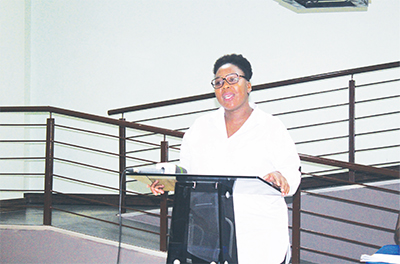ByMpho Shelile
MASERU – The Lesotho National Federation Organization of the Disabled (LNFOD) is taking the necessary steps in promoting inclusivity, equality, and social justice for individuals with disabilities which is a crucial aspect. They are raising awareness and educating people about the rights, needs, and challenges faced by people with disabilities. This we got to see at a sensitization on disability conference held at Victory Hall on the 26th October. Where all media houses were called to learn on how to report better news and were equipped with knowledge on how to approach and interview them.
ADV. Lerato a human rights officer from LNFOD stated that diversity, equity and inclusion (DEI) initiatives are becoming. However, when it comes to these efforts, disability is often not given the same level of attention as other factors like gender, ethnicity, culture, race or sexuality. Stressing that it was about time this narrative changed.
“Obstacles such as exclusionary norms, attitudinal barriers, and inadequate policies may hinder full participation” said ADV. Lerato, adding that over the past decades there has been a dramatic shift in the way persons with disabilities are viewed. Where once they were seen as passive recipients of aid, often geared to their impairment-related health needs, today people with disabilities are viewed as people with the same rights as non-disabled persons. She added that this human rights-based approach recognizes that disability is an important dimension of humankind and affirms that all people have certain inalienable civil, political, economic, social and cultural rights, including labour rights.
“LNFOD is working to strengthen the capacity of journalists, disability advocates, and representatives of government broadcasting authorities to produce fair and accurate reporting on disabilities and promote rights and opportunities for disabled persons. Working within the training model established, which includes, among other components, an overview of international standards on disability, the role of the LNFOD in promoting skills and work for disabled persons, and new angles for reporting stories on the issue, provides practical guidance to the media on how to effectively report on disability, and stimulates a climate of inclusion on non-discrimination and equal opportunity”, She said.
However, there is a need for much more impactful, profound, systemic change. A social model of disability involves actively and consistently working towards removing barriers to full participation in employment. We got to learn that persons with disability have barriers that are both social and economic, including inaccessible physical environments and transportation, the unavailability of assistive devices and technologies, non-adapted means of communication, gaps in service delivery, and discriminatory prejudice and stigma in society.
The workshop also aimed on focusing on challenges to reporting on disability, advice on how to interview disabled women and men, and building relationships with disability advocates. As a result of the training, journalists have gained a better understanding of the importance of including a disability perspective in their reporting and the role they play in advocating for the rights of disabled persons. She indicated that providing journalists with additional information and resources on how to report news of the persons with disability is one way of them taking the right step to fighting for the rights of the disabled people.
Mrs. Masenono Letsie from LNFOD Gender Office said there are many factors that prevent women and men with intellectual disabilities from accessing employment on an equal basis with non-disabled persons. These include: traditional vocational training systems that adopt a train and place model with little or no transitional training or support for challenges confronted on the job, and the non-enforcement of laws on the right to employment of persons with disabilities. Negative views and attitudes of workers and prospective employers also contribute to the exclusion of people with disabilities from the workplace. Adding that gender plays a major role when it comes to disability.
Many people with disabilities remain outside of formal employment due to a number of factors including: lack of access to education, vocational rehabilitation and training, disincentives created by disability benefits, the inaccessibility of the workplace and employers’ perceptions of disability and disabled people. In improving the labour market opportunities for job seekers with disabilities, access to skills training and employment consultation services are among the key strategies for eliminating barriers to their full participation in the world of work. Yet persons with disabilities are part of the skills and talent pool. A key to tapping into this talent pool is matching a job with the skills, interests and abilities of the disabled person.
“The most brutal form of violence is murder, and despite numerous awareness raising campaigns to end gender based violence, there are still cases of a person with disability going through such horrible acts. This piece is a call to the government to end impunity against sexual gender based violence, against women and girls with disabilities, to magnify the voices of persons with disabilities through empowerment by investing in awareness raising programs, capacity building amongst stakeholders among others, provision of accommodations in essential services and increased partnerships to prevent GBV against persons with disabilities in all its forms. The inclusion of persons with disabilities in the national GBV response programs should be visible in the design and implementation phases, LNFOD accordingly urges the national.”
“We call upon all media houses to join hands to end violence against women and persons with disability, let us use this conference initiative as a multiyear effort to prevent and eliminate violence against women and girls with disability around the world”, she concluded by pleading with the media, private sectors and the government to join hands, so that they increase the employability of persons with disabilities promoting inclusive workplaces, fostering and enabling legal and policy environment while also improving media reporting on disability.


